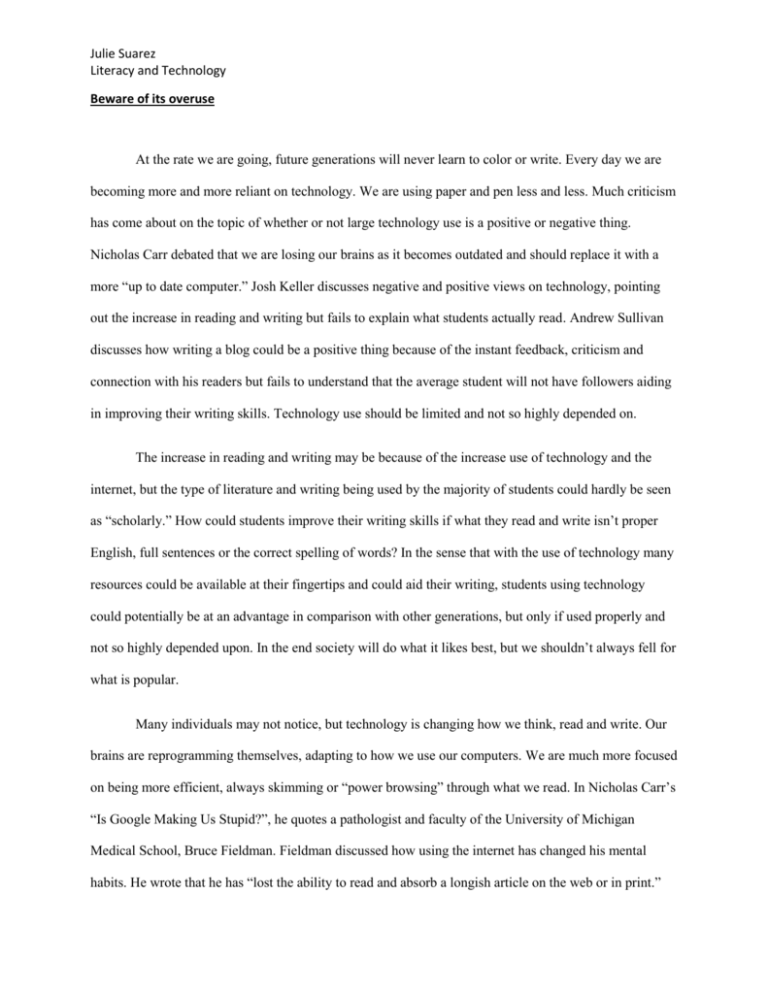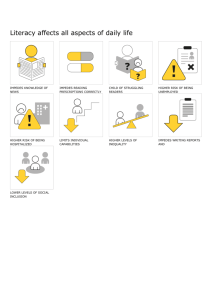technology paper
advertisement

Julie Suarez Literacy and Technology Beware of its overuse At the rate we are going, future generations will never learn to color or write. Every day we are becoming more and more reliant on technology. We are using paper and pen less and less. Much criticism has come about on the topic of whether or not large technology use is a positive or negative thing. Nicholas Carr debated that we are losing our brains as it becomes outdated and should replace it with a more “up to date computer.” Josh Keller discusses negative and positive views on technology, pointing out the increase in reading and writing but fails to explain what students actually read. Andrew Sullivan discusses how writing a blog could be a positive thing because of the instant feedback, criticism and connection with his readers but fails to understand that the average student will not have followers aiding in improving their writing skills. Technology use should be limited and not so highly depended on. The increase in reading and writing may be because of the increase use of technology and the internet, but the type of literature and writing being used by the majority of students could hardly be seen as “scholarly.” How could students improve their writing skills if what they read and write isn’t proper English, full sentences or the correct spelling of words? In the sense that with the use of technology many resources could be available at their fingertips and could aid their writing, students using technology could potentially be at an advantage in comparison with other generations, but only if used properly and not so highly depended upon. In the end society will do what it likes best, but we shouldn’t always fell for what is popular. Many individuals may not notice, but technology is changing how we think, read and write. Our brains are reprogramming themselves, adapting to how we use our computers. We are much more focused on being more efficient, always skimming or “power browsing” through what we read. In Nicholas Carr’s “Is Google Making Us Stupid?”, he quotes a pathologist and faculty of the University of Michigan Medical School, Bruce Fieldman. Fieldman discussed how using the internet has changed his mental habits. He wrote that he has “lost the ability to read and absorb a longish article on the web or in print.” Julie Suarez Literacy and Technology He thinks of it as a “staccato” quality way of thinking. “Even a blog post of more than three or four paragraphs is too much to absorb. I skim it.” To further validate this statement, many interviews were taken from different generations on how technology use has effected them. Students in an ENC1102 class were asked their opinions about technology and compared writing online to paper and pen, many stated how they were more comfortable writing a blog than turning in a paper. One student stated to have incomplete thoughts because of her writing being incomplete while she uses the internet. In this interview two classmates agreed on their grammar skills being weakened, more than spelling, as a result of computer use. Students also agreed with Carr’s and Fieldman’s statement on how they skim long articles rather than fully reading them. As a class experiment, think aloud protocols were used. Students were asked to say out loud their thoughts and actions while doing them. when reading, most articles were not completely read, pictures and bold headings were not focused on. Companies have been competing to create the perfect search engine. The faster and more efficient the search engines become the “more productive we become as thinkers.” In many groups students agreed with Dennis Baron and his realization to being unable to write. In a segment from Baron’s “In Passions, Peoagogies, and 21st Century Technologies” called “From Pencils to Pixels The Stages of Literacy technology” he states that he has become so reliant on technology he could “no longer draft anything coherent directly on a piece of paper… the physical effort of handwriting, crossing out, revising, cutting and pasting… now seemed to overwhelm and constrict me, and I longed for the flexibility of digitized text.” Students said that writing would hurt their arms and would get exhausted when writing by hand. Despite students reading and writing more, there hasn’t been an increase in skill. In Josh Keller’s “Studies Explore Whether the Internet Makes Students Better Writers,” he quote an English professor of Emory University, Mark Bauerlin on how he sees it as a paradox, “Why is it that with young people reading and writing more words than ever before in human history, we find no gains in reading and Julie Suarez Literacy and Technology writing scores?” When looking at the Florida’s writing scores for tenth graders, provided at the Florida Department of Education website, there has been no increase. It averaged at 3.9 in the year 2000 and is still at a 3.9 average in the year 2010. This proves Bauerlin’s point, there is no increase in writing scores despite the enormous amount of writing. Despite the increase in writing, the writing is not improving and is actually lacking. This period is being considered “the age of composition” (Kathlean Blake Yancey, Keller) because of such increase in writing. According to “Standford Study of Writing” only a small percentage of the total writing was school writing. Writing online is very different form writing a formal paper. Students are writing to their peers as an audience. “You’re writing to other 17 year olds, so your vocabulary is going to be the conventional vocabulary of a 17 year old idiom,” Bauerlin says. He blames the internet for his students “stylistic impoverished” papers. He says the internet is encouraging quick and unfocused thoughts. Even though students are reading more than ever, what they are reading isn’t actually reading. Before reading consisted of scholarly articles and book; now it is friends’ status, which lacks any depth. For a student to grow as a writer he must learn rules, enhance vocabulary, etc, but the only thing being learned and ingrained in his head are horrible grammar, basic punctuation errors and slang terms. Most things posted in Facebook by students are basically the same. Using a Facebook status of an 18 year old male as an example: Stanley “Cravin dem pizza n fries i had in nyc mmmmm im hungrt,” a simple sentence butchered by misspellings and errors. Most students post statuses like this. How could this be improving their vocabulary and writing skills? In Andrew Sullivan’s “Why I Blog” he explains how blogging has improved his writing skills because he has been able to receive instant feedback from his readers. The criticism helps him focus on having the right tone as well as proper language. Unfortunately for the average student, most of their readers don’t know any better than they do. A helpful criticism would not be available. Instead bad writing is encouraged and enforced. He states that “blogging rewards brevity and immediacy. No one wants to read a 9000-word treatise online. On the web, one-sentence links are as legitimate as thousand- Julie Suarez Literacy and Technology word diatribes- in fact, they are often valued more.” That statement shows how lazy readers we have become. We are no longer encouraging great stories filled with long paragraphs of details once seen in classic literature like that of Edgar Allen Poe. The internet reinforces ugly fragments. The more we use and rely on technology the closer we are to becoming “artificial intelligence.” Carr points out that people have been becoming machine like as our brains work as computers. In “Stanley Kubrieks’s 2001: A Space Odyssey” Kubriek has a dark prophecy that “as we come to rely on computers to mediate our understanding of the world, it is our own intelligence that flattens into artificial intelligence. Furthermore, the human brain has adapted itself to work like a computer. Unfortunately, Google’s founders Sergy Brin and Larry Page believe that humans would be better off if our brains were supplemented or completely replaces. “The human brain is just an outdated computer that needs a faster processor and a bigger hard drive.” Children should not learn to rely so heavily on technology. They should be taught to write on paper and understand that although technology is convenient, it isn’t the best tool in helping them grow as writers. Parents should not fall into the new fad. Parents should teach their children to write on paper and color, just like they once did. It is essential for parents to prevent their children from becoming a brain dead generation only able to write when using a technological device. Also to use the internet as a resource, but use it properly by checking is validity and authors. Although technology can be a great thing by allowing us to have so many resources at the tip of our fingers, it is proving to be decreasing or skill rather than improving it.








